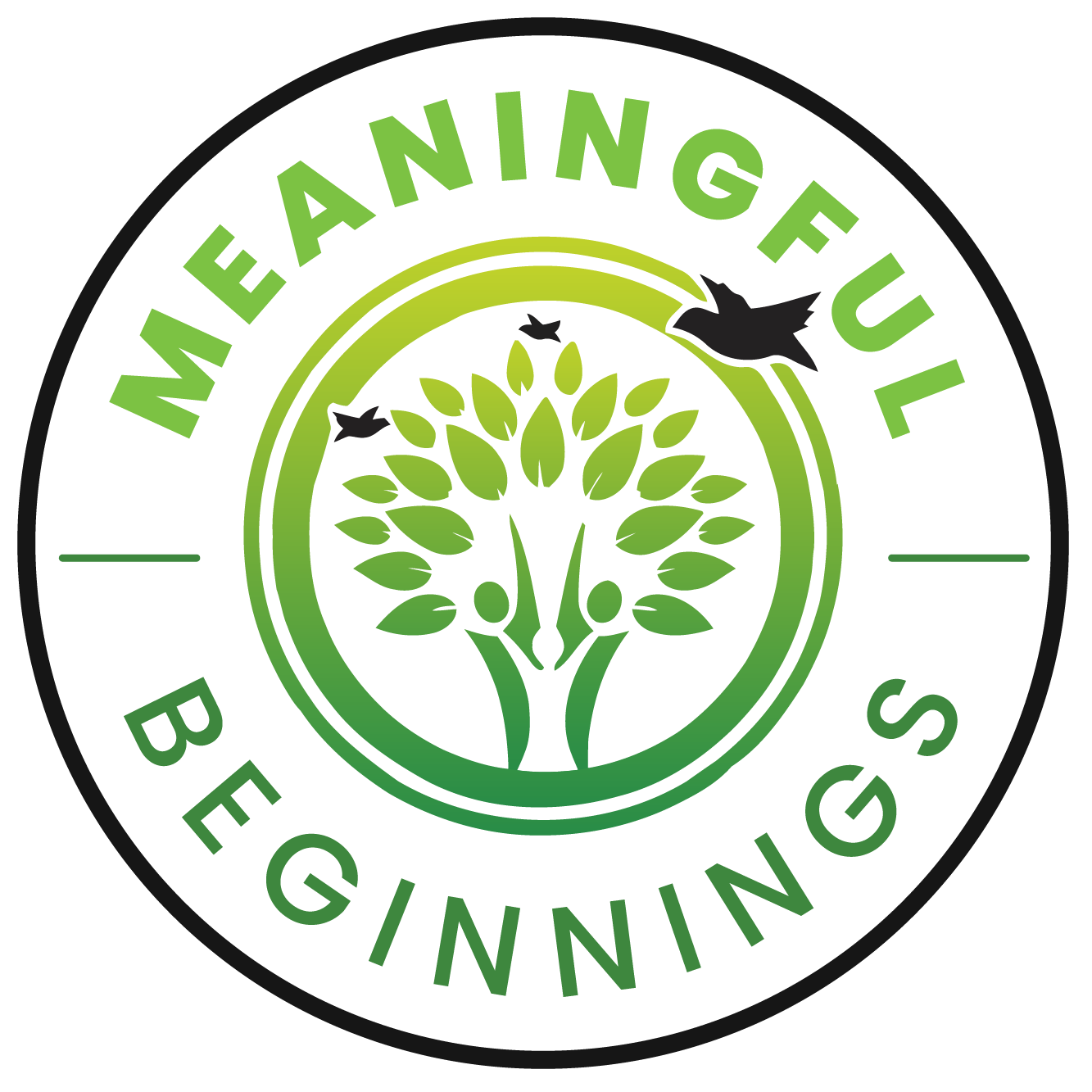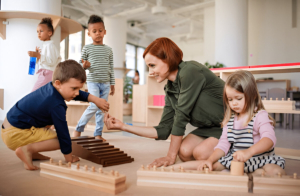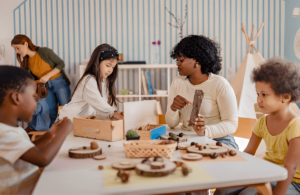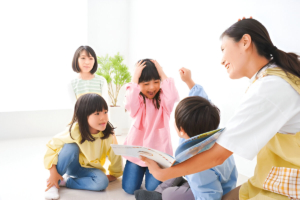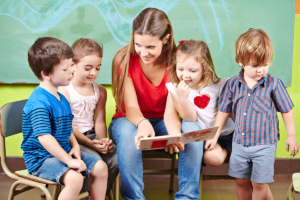Explore the social benefits of daycare, from fostering peer interactions to building communication skills and nurturing empathy in children.
Introduction: The Role of Daycare in Social Development
As you navigate the exciting journey of raising your little ones, you might be wondering about the benefits of daycare. Beyond the convenience and childcare support, did you know that daycare plays a significant role in your child’s social development? Let’s dive into this topic!
Fostering Peer Interactions: Learning to Play and Share
One of the first social benefits of daycare is the opportunity for your child to interact with peers. At Meaningful Beginnings, we provide a safe and supervised environment where children can play, share, and learn from each other.
Remember the time when little Timmy learned to share his favorite toy truck with his friend Sarah? That was a big milestone in his social development, and we were there to guide and encourage him.
Developing Emotional Intelligence: Understanding and Expressing Feelings
Daycare also plays a crucial role in developing emotional intelligence. At our center, we help children understand and express their feelings in a healthy way. Our “Feelings Corner” is a dedicated space where children can express their emotions and learn to empathize with others.
Building Communication Skills: The Art of Conversation
Communication is a fundamental social skill that forms the basis for all types of human interactions. In a daycare setting, children have numerous opportunities to practice and enhance their communication skills, setting the stage for successful social interactions throughout their lives.
Encouraging Expressive Language
At Meaningful Beginnings, we encourage children to express their thoughts, needs, and feelings verbally. This could be as simple as asking for a toy, describing a drawing, or sharing about their day. Our educators are trained to use open-ended questions and prompts to stimulate more complex and detailed responses.
Promoting Active Listening
Listening is just as important as speaking in communication. We teach children to listen to their peers, wait their turn to speak and respond appropriately. This not only shows respect for others but also helps children understand different perspectives and build stronger relationships.
Facilitating Group Discussions
Group discussions are a regular part of our daily routine at Meaningful Beginnings. During circle time, children are encouraged to share their ideas and listen to others. This not only enhances their speaking and listening skills but also teaches them about taking turns and respecting others’ opinions.
Enhancing Non-Verbal Communication
Communication isn’t just about words. Non-verbal cues like facial expressions, body language, and gestures also play a crucial role. We help children understand these cues and use them effectively in their interactions.
For instance, during our “Emotion Charades” game, children have a blast trying to express different emotions without using words. It’s a fun way to enhance their non-verbal communication skills!
In conclusion, building communication skills is a key aspect of social development in daycare. By encouraging expressive language, promoting active listening, facilitating group discussions, and enhancing non-verbal communication, we’re helping children master the art of conversation.
Encouraging Cooperation and Teamwork: Learning to Work Together
Another significant social benefit of daycare is the emphasis on cooperation and teamwork. At Meaningful Beginnings, we provide plenty of opportunities for children to work together, whether it’s during a group project, a game, or a daily routine.
Take our “Garden Buddies” program, for example. Children work together to plant and care for a small vegetable garden at our center. This not only teaches them about nature and responsibility but also promotes cooperation and teamwork.
Nurturing Empathy: Understanding Others’ Feelings
Empathy is a crucial social skill that allows children to understand and share the feelings of others. At our daycare, we nurture empathy through activities that encourage children to imagine how others might feel in different situations.
Our “Story Time” is a great example. We often read stories that explore various emotions and discuss how the characters might be feeling. This helps children develop a deeper understanding of emotions and fosters empathy.
Promoting Respect and Tolerance: Appreciating Differences
In our diverse and inclusive community, we place a strong emphasis on respect and tolerance. We teach children to appreciate differences and treat everyone with kindness and respect.
Our “Cultural Celebration Week” is a highlight of the year. Children learn about different cultures, traditions, and lifestyles, promoting a sense of respect and appreciation for diversity.
In the next sections, we’ll discuss how daycare helps build confidence and self-esteem and teaches children about conflict resolution. Stay tuned!
Building Confidence and Self-Esteem: Feeling Good About Oneself
Confidence and self-esteem are crucial for a child’s social development and overall well-being. At Meaningful Beginnings, we strive to create a supportive and positive environment where children can feel good about themselves.
We celebrate each child’s unique strengths and achievements, no matter how small. Remember when little Mia tied her shoelaces for the first time? We cheered her on and celebrated this accomplishment, boosting her confidence and self-esteem.
Learning Conflict Resolution: Navigating Disagreements
Conflict resolution is an essential social skill that helps children navigate disagreements and maintain healthy relationships. In a daycare setting, children are exposed to various social situations where conflicts may arise. By guiding them through these situations, we can teach them valuable conflict-resolution skills that will serve them well throughout their lives.
Teaching Effective Communication
Effective communication is the cornerstone of conflict resolution. At Meaningful Beginnings, we help children express their feelings and needs clearly and respectfully. We also teach them to listen to others and consider their perspectives. This open and respectful communication is crucial for resolving conflicts in a constructive manner.
Encouraging Problem-Solving
Problem-solving is another key aspect of conflict resolution. We guide children in identifying the root cause of a disagreement and brainstorming possible solutions. By involving them in the problem-solving process, we empower them to take ownership of the situation and work towards a resolution.
Modeling Empathy and Understanding
Empathy and understanding are essential for resolving conflicts in a compassionate and respectful manner. At our daycare, we model empathy by acknowledging each child’s feelings and validating their emotions. We also encourage children to put themselves in others’ shoes and consider how they might feel in a given situation.
Promoting Cooperation and Compromise
Cooperation and compromise are important skills for navigating conflicts and finding mutually agreeable solutions. We teach children to be flexible and open to different ideas, emphasizing the importance of working together to resolve disagreements.
For example, when two children have a disagreement over a game, we might suggest they come up with a new set of rules that both parties can agree on. This teaches them the value of compromise and cooperation in resolving conflicts.
In conclusion, learning conflict resolution skills in daycare helps children navigate disagreements and maintain healthy relationships throughout their lives. By teaching effective communication, problem-solving, empathy, and cooperation, we’re equipping children with the tools they need to handle conflicts in a respectful and constructive manner.
Conclusion: The Lasting Impact of Social Skills Learned in Daycare
In conclusion, the Social Benefits of Daycare daycare play a significant role in building a foundation for healthy relationships. From fostering peer interactions and developing emotional intelligence to building communication skills and promoting respect and tolerance, the social benefits of daycare are immense.
At Meaningful Beginnings, we’re committed to supporting your child’s social development and preparing them for a lifetime of healthy relationships. Contact us today to learn more about our programs and how we can support your child’s growth and development.
